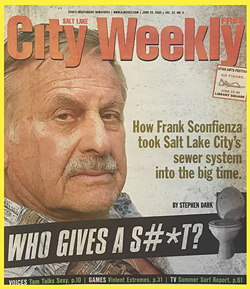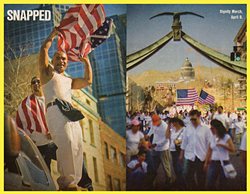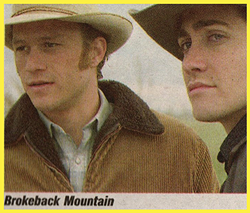"Happy the People whose Annals are blank in History Books," mused Thomas Carlyle with an aphorism attributed to the philosopher Montesquieu. Perhaps there are those who find a sufficiently stable and harmonious existence that they have little cause for appearing in the recorded doings of their day. Or maybe the general recordkeeping just sucked.
Neither appeared to be the case for the denizens of our beloved Beehive during City Weekly's 22nd year. The paper followed comings and goings, advances and setbacks and fights and celebrations of varying sizes.
These were times when Hurricane Katrina evacuees touched down at Camp Williams and President George W. Bush's visit to Salt Lake was met with a protest in Pioneer Park. Gov. Jon Huntsman Jr. vetoed a plan to double the size of Envirocare (later EnergySolutions) despite efforts by Draper's state Sen. Howard Stephenson to remove gubernatorial signoff. And after a costly lawsuit, the Legacy Parkway controversy was settled with a compromise that resulted in a downscaled road and 2,200 acres of wetland preserve.
Then-state Sen. Chris Buttars (1942-2018) was running wild with bills pushing creationism and banning gay-straight alliance clubs; computer pitchman Dell Schanze was speeding through neighborhoods and brandishing weapons; and 90 officers in assault gear raided an event at a Spanish Fork Canyon ranch for not having the Utah County Commission's permission to operate.
Walmart got its way, placing a store on Sandy's then-undeveloped gravel pit despite local opposition. The Salt Lake Bees got their original 1915 name back after decades under other monikers. A compromise hate-crimes bill was finally passed after many years of effort. And more than 40 religious leaders—led by Carolyn Tanner Irish (1940-2021), then-Episcopal bishop of Utah—condemned the use of torture on U.S. war prisoners.
On top of which, there were unique stories covered by our writers, such as Ted McDonough's article on Utah's Greek-owned burger establishments and Carolyn Campbell's investigation into violence and abuse against the city's homeless. Angie Mathews took a look at the burgeoning mixed martial arts scene, and Stephen Dark wrote stories about Huntsville's now-shuttered Abbey of Our Lady of the Holy Trinity as well as the origins of Salt Lake's modern sewer system.
Life in Utah was indeed "elevated," to use a word from the state's new (and maligned) branding slogan. The jury's still out on whether we should have left that particular annal blank for posterity.
Remembering Vol. 22: In the paper
City Weekly underwent more changes—and not just because we were now on MySpace. After a decade of writing a monthly column, Bruce Baird bade farewell in the "Voices" section. Phil Jacobsen, who had contributed a feature called "Grain of Salt" earlier in the decade, returned with a new column on nightclubs and bars called "Temporary Membership." Nigel Thames, aka local singer Tony Oros, also began contributing a monthly advice column called "Dear Rockstar."
"Life in Hell," "Zippy," "The City," and the cartoons of Lynda Barry—all longtime mainstays in the paper—were retired. Elsewhere in the paper, new sections appeared, such as Shane Johnson's police feature "Blotter Fodder," the humorous deadpan of the "Ocho" list, short takes from local citizens telling it "The Way It Is" and a new showcase for former missionaries to share insights and adventures of life outside of Utah. This being City Weekly, said showcase was dubbed "The Missionary Position."
En la comunidad
"These are the shock troops of the virulently anti-immigrant Utah Minuteman Project," began Ted McDonough's July 21 cover story of 2005. "They gathered through the magic of talk radio under a 'Don't Tread on Me' banner, grasping Old Glory and hand-drawn protest signs: 'Bush: Close Our Borders Before Iraq.'"
The Minutemen Project—on whose actions McDonough was reporting after they protested local banks serving Mexican immigrants—was finding some success despite their limited numbers. They received media coverage for their armed "guarding" trips down to the Arizona/Mexico border as well as successfully backing legislation to yank driver-license privileges and repeal in-state tuition rates for undocumented immigrants and their children.
Oscar Faria, speaking to Naomi Zeveloff in a companion piece to McDonough's article, drew on his faith when he considered the panic over immigration typified by groups like the Minutemen. "There are fabulous things coming for the immigrants," Faria said. "In their path, there must be opposition. The night for the day, the darkness for the light. We don't know what good is unless we know what bad is. We can't know success without failure."
In a year of stories that often touched upon Utah's Latino population—capped off by Mexican President Vicente Fox's historic visit to Utah—both darkness and light were on display in the Beehive State. Nevertheless, the vibrant humanity of the community at large, like the artworks of such creatives as Pilar Pobil and Guillermo Colmenero—as profiled by Stephen Dark on March 9—was getting public notice and respect.
This was most dramatically seen with the April 9 Dignity March of 2006, which gathered to push for immigration reform granting legal status to undocumented workers. Students from several Salt Lake County schools had already protested with a walk-out days before, and the April 9 march was to register solidarity with the immigrant population on an even grander scale. At approximately 43,000 participants, it was then the largest march in state history.
"Most of those marching were either Hispanic or Latino," John Saltas reported on April 13. "They were joined by 'compadres' of many stripes. Most of those expressing 'estan de acuerdo' were not fearful of deportation, though. That cannot be said of many in that march walking publicly with full knowledge that they could be yanked from the street and sent back from whence they came—mostly from areas south of the Rio Grande."
Minutemen, vastly outnumbered, attended the event as well. Their presence quite literally paled before the joyful and dignified occasion. "I've never seen anything like it in the City of Salt," wrote Bob Trujillo in an April 20 letter. "For nearly an hour, I stood on the sidewalk and watched the people march by. From one sidewalk to the other, a sea of brown faces. ... It stirred my soul. It still does."
In the Megaplex?
Director Ang Lee's award-finning film Brokeback Mountain debuted in late 2005. But a rather sorry controversy was generated locally when the film was abruptly pulled from scheduled screenings at the Larry H. Miller Megaplex Theatres in Sandy.
"Miller owns the complex and can show whatever films he chooses," commented John Saltas on Jan. 12. "But by booking the film in the first place, then canceling the showing at the last minute, he clearly inconvenienced and enraged some people."
The cancellation was reportedly brought on after Miller learned of the gay cowboy drama's plot during a radio interview. His decision brought unwelcome publicity to the state and generated a local boycott of Miller-owned businesses. Miller later admitted his "knee-jerk reaction" was a mistake to The Salt Lake Tribune in 2007, adding: "You have to choose your spots to draw your lines, and I didn't choose a very good one."
Ben Fulton noted on Jan. 12 that the film hadn't exactly been suppressed from the public, as it was still playing at other Utah venues. "As it is, Brokeback Mountain leaves the gay community looking desperate and Larry Miller looking silly," Fulton added. "The real casualty is the film itself, which needs no one to advocate its many virtues, never mind the fearful who deride it without so much as seeing it. It stands on its own and speaks to anyone who's grown up or lived in the American West."
Fulton closed his editorial with this: "It's a sign of the times that people on the left and right expect so much from a movie. Americans have become so insular we barely react anymore to events or people in other parts of the world, but to the latest sensational movie in our neighborhood, and the opinion our neighbor has about that movie. How very safe. How very boring."
More by Wes Long
-
40 Years of City Weekly—Volume 37: 2020 to 2021
City Weekly Rewind
- May 1, 2024
-
40 Years of City Weekly—Volume 36: 2019 to 2020
City Weekly Rewind
- Apr 24, 2024
-
40 Years of City Weekly—Volume 35: 2018 to 2019
City Weekly Rewind
- Apr 17, 2024
- More »








